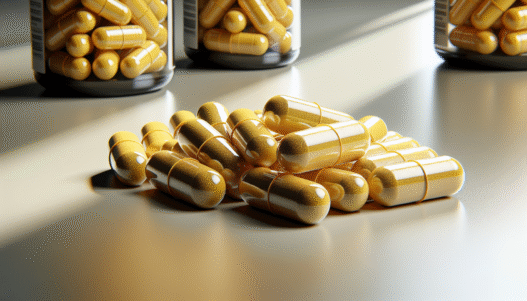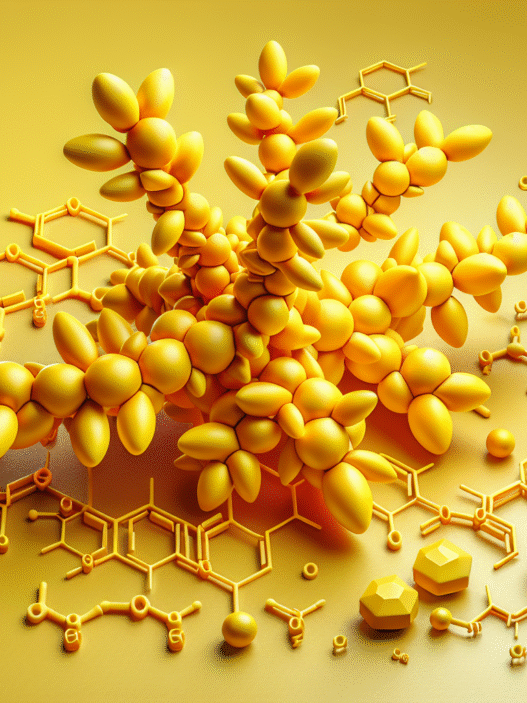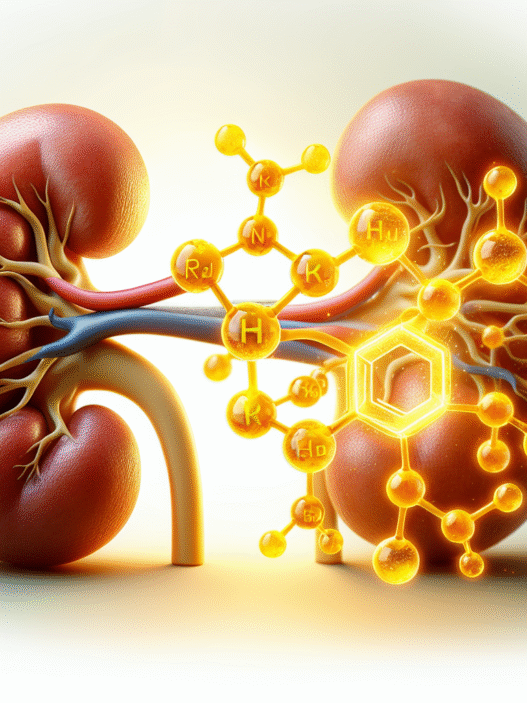Exploring Berberine Supplements
Introduction to Berberine
Berberine is a natural botanical alkaloid found in several plants, primarily from the Berberis genus. This compound has gained attention in recent years due to its potential health benefits, particularly in the fields of functional medicine and holistic wellness. Researchers are exploring its effects on various health conditions such as diabetes, high cholesterol, and weight management. This compound is celebrated not only for its pharmacological properties but also for its historical significance in traditional medicine.
Studies suggest that berberine has various beneficial effects, including improving blood sugar regulation, enhancing gut health, and exhibiting anti-inflammatory and antioxidant properties. For those interested in exploring these potential benefits, berberine supplements offer an accessible option for incorporating this compound into their health regimen.
Historical Use of Berberine
The use of berberine dates back over 3,000 years, with historical records indicating its applications in ancient cultures such as Chinese and Ayurvedic medicine. The oldest evidence of using berberine-containing plants can be traced back to 650 BC in Assyria (Source). Ancient practitioners utilized berberine for a wide range of health issues, including inflammatory disorders, skin diseases, wound healing, and fever reduction.
In traditional Chinese medicine, berberine has been employed to treat various ailments, making it a cornerstone of natural health practices for centuries. Its use in Ayurvedic remedies reflects its adaptability and enduring relevance across different cultures. Understanding the historical context of berberine can shed light on its potential benefits today, as modern research continues to validate many of its traditional uses.
| Time Period | Region | Uses |
|---|---|---|
| 650 BC | Assyria | Treating inflammatory conditions and microbial infections |
| Over 3000 years | China & South Asia | Wound healing, treating skin diseases, reducing fevers |
| Ancient India | Asia | Ayurvedic treatments for various health issues |
As research into berberine continues, its historical applications remain a testament to its therapeutic potential. For more information on how berberine can impact health today, explore links on berberine and gut health and berberine and blood pressure.
Health Benefits of Berberine
Berberine supplements offer numerous health benefits that have garnered attention from those interested in functional medicine and holistic wellness. This section discusses four key benefits of berberine: blood sugar regulation, weight management, heart health improvement, and its anti-inflammatory and antioxidant properties.
Blood Sugar Regulation
Berberine has been shown to effectively lower blood sugar levels. A study conducted in 2008 indicated that participants taking 1 gram of berberine per day experienced a 20% reduction in fasting blood sugar and a 12% decrease in hemoglobin A1c (HbA1c) levels. This makes berberine a valuable option for individuals managing diabetes.
| Study Findings | Blood Sugar Reduction | HbA1c Reduction |
|---|---|---|
| 2008 Study | 20% | 12% |
Weight Management
Berberine supplementation may lead to significant weight loss in individuals with obesity. On average, studies have shown about a 5-pound reduction in weight, along with decreases in body fat and body mass index (BMI). Berberine also inhibits fat cell growth at the molecular level, making it a beneficial supplement for those aiming to lose weight.
| Measurement | Average Change |
|---|---|
| Weight Loss | ~5 pounds |
| Body Fat | Decreased |
| BMI | Decreased |
Heart Health Improvement
Research indicates that berberine may help lower total cholesterol, “bad” cholesterol (LDL), and triglycerides in individuals with high cholesterol levels. This effect is particularly advantageous for individuals who may not respond well to standard cholesterol medications.
| Cholesterol Type | Effect |
|---|---|
| Total Cholesterol | Decrease |
| LDL Cholesterol | Decrease |
| Triglycerides | Decrease |
Anti-inflammatory and Antioxidant Properties
Berberine is noted for its potent antioxidant and anti-inflammatory effects. These properties not only contribute to overall health but also provide potential benefits against various conditions such as depression, nonalcoholic fatty liver disease (NAFLD), and heart failure. These benefits make berberine a versatile supplement for addressing a range of health concerns.
In summary, berberine supplements present a wealth of health benefits for individuals interested in enhancing their well-being. From regulating blood sugar to aiding in weight loss and improving heart health, berberine has established itself as a notable aid in functional medicine. For further reading on the effects of berberine on different health concerns, explore our articles on berberine benefits and other related topics.
Clinical Studies on Berberine
Research on berberine supplements has provided valuable insights into their potential health benefits, specifically relating to diabetes management, cholesterol levels, and cardiovascular health.
Impact on Diabetes
Clinical studies have shown that berberine can significantly lower blood sugar levels in individuals with type 2 diabetes. In one notable study involving 116 participants, daily supplementation of 1 gram of berberine resulted in a 20% reduction in fasting blood sugar and a 12% decrease in hemoglobin A1c (HbA1c) levels. The effects of berberine were found to be comparable to certain oral diabetes medications.
| Measurement | Before Berberine Use | After Berberine Use |
|---|---|---|
| Fasting Blood Sugar (mg/dL) | ~160 | ~128 |
| HbA1c (%) | ~8.0 | ~7.0 |
Effects on Cholesterol Levels
Berberine supplementation has demonstrated positive effects on lipid levels within the body, improving overall cholesterol profiles. It may lead to reductions in total cholesterol, LDL cholesterol (often referred to as “bad” cholesterol), and triglycerides. Studies indicate that combining berberine with standard cholesterol treatments can further enhance these results, contributing to improved heart health in individuals at risk (WebMD).
| Lipid Measurement | Change (%) |
|---|---|
| Total Cholesterol | Decreased by 15% |
| LDL Cholesterol | Decreased by 10% |
| Triglycerides | Decreased by 12% |
Cardiovascular Benefits
Berberine has been associated with cardiovascular health improvements. Research suggests that individuals taking berberine supplements, alongside standard heart disease treatments, experienced a reduction in symptoms such as fatigue and irregular heartbeats. The regular use of berberine has the potential to lower the risk of death among patients with heart disease without significant side effects (WebMD).
Additional studies continue to investigate the mechanisms through which berberine exerts its beneficial effects, focusing on areas such as its impact on inflammation and oxidative stress, which are critical factors in maintaining cardiovascular health.
These findings underscore the potential of berberine supplements in addressing significant health concerns, making it an attractive option for those interested in functional medicine and holistic wellness approaches. For more detailed insights on its usability and additional benefits, refer to our overview of berberine benefits.
Potential Risks and Considerations
As beneficial as berberine supplements can be, they are not without potential risks. It’s important for individuals considering these supplements to be aware of possible interactions and health implications.
Drug Interactions
Berberine might interact with various medications, specifically those that affect the liver. It has the potential to alter how quickly the liver breaks down certain medications, particularly those processed by the Cytochrome P450 3A4 enzyme. This interaction can lead to unintended effects or increased side effects of medications (WebMD). Individuals taking multiple medications should consult healthcare providers before starting berberine.
Another concern is that berberine may slow blood clotting, increasing the risk of bruising and bleeding when combined with blood-thinning medications. This risk is significant for individuals on anticoagulants or those predisposed to bleeding disorders.
Blood Sugar Levels and Hypoglycemia
One of the prominent benefits of berberine is its ability to lower blood sugar levels. However, this can lead to a risk of hypoglycemia, especially for people taking diabetes medications. Monitoring blood sugar levels is essential to avoid drops that can cause symptoms such as dizziness, confusion, or fainting (WebMD). For those managing diabetes, it’s critical to work closely with healthcare providers when incorporating berberine.
Blood Pressure Concerns
Similarly, berberine may have a hypotensive effect, potentially lowering blood pressure. When taken alongside medications designed to reduce blood pressure, there is a heightened risk of experiencing hypotension (low blood pressure). This condition can lead to symptoms like lightheadedness, fatigue, or in more severe cases, fainting. Regular monitoring of blood pressure is important for those taking both berberine and antihypertensive medications.
It is advisable for consumers to assess these risks with their healthcare provider before beginning any new supplement regimen, particularly those involving berberine. Understanding these considerations can help ensure safety and optimize the benefits of berberine supplements.
Mechanisms of Action
Understanding how berberine supplements work is essential for appreciating their potential health benefits. This natural compound exhibits several mechanisms that contribute to its effects on health, particularly related to metabolic function and overall wellbeing.
AMP-activated Protein Kinase Activation
Berberine activates AMP-activated protein kinase (AMPK), a key regulatory enzyme in energy metabolism. This activation leads to several beneficial outcomes, including reduced fat production, improved insulin sensitivity, and enhanced glucose transport (PubMed Central). AMPK activation is crucial as it helps regulate how the body uses energy and responds to nutritional inputs, allowing for better management of blood sugar levels and fat metabolism.
| Outcome | Effect of AMPK Activation |
|---|---|
| Fat production | Decreased |
| Insulin sensitivity | Increased |
| Glucose transport | Enhanced |
Impact on Insulin Response
Berberine’s effect on insulin response is pivotal for those struggling with insulin resistance and type 2 diabetes. It has been shown to mitigate insulin resistance, leading to improvements in blood glucose levels. By stimulating glycolysis and improving insulin secretion from pancreatic islet cells, berberine helps manage blood sugar spikes related to meals (NCBI). These actions make berberine a strong candidate for supporting metabolic health.
| Diabetes Management | Effect of Berberine |
|---|---|
| Fasting blood glucose | Decreased |
| Postprandial blood glucose | Decreased |
| Insulin resistance | Reduced |
Effects on Lipid Metabolism
Berberine also positively influences lipid profiles by reducing total cholesterol and low-density lipoprotein (LDL) cholesterol levels. Clinical studies have demonstrated that participants using berberine supplements showed significant improvements in lipid profiles after just four weeks. This effect is crucial for cardiovascular health, as managing cholesterol levels is a key factor in preventing heart disease.
| Lipid Profile Improvement | Effect of Berberine |
|---|---|
| Total cholesterol | Decreased |
| LDL cholesterol | Decreased |
| Triglycerides | Potentially decreased |
The mechanisms by which berberine operates underscore its potential as a powerful supplement for improving health outcomes, especially for individuals concerned with metabolism, cardiovascular health, and diabetes management. For more information about the advantages of berberine, explore our comprehensive article on berberine benefits.
Future Research and Applications
Gut Microbiota Modulation
Emerging research indicates that berberine may play a significant role in modulating gut microbiota. Studies have shown that berberine can decrease the Firmicutes/Bacteroidetes ratio, helping to restore the balance of beneficial bacteria. This includes an increase in the abundance of Bacteroidetes, which is associated with improved metabolic function. Furthermore, berberine alters microbial bile acid composition and reduces the presence of bacteria that produce branched-chain amino acids, which can influence blood glucose and lipid levels (NCBI). These findings suggest that berberine could be an effective supplement for enhancing gut health.
| Effect | Outcome |
|---|---|
| Decrease in Firmicutes/Bacteroidetes ratio | Restoration of beneficial bacteria |
| Increase in Bacteroidetes abundance | Enhanced metabolic function |
Anti-inflammatory Effects
Berberine exhibits strong anti-inflammatory properties by reducing the expression of inflammatory proteins such as IL-1, IL-6, and TNF. It also affects the cyclooxygenase-2 (COX-2) and prostaglandin E2 pathways, acting on the NF-κB signaling pathway, which is crucial for regulating inflammation. Additionally, berberine inhibits IL-8 production in cancer cells and decreases other inflammatory molecules like nitric oxide and TNF-α. This anti-inflammatory activity may have critical implications for the prevention of various inflammatory conditions, including colorectal cancer. For more on this topic, see our article on berberine’s anti-inflammatory effects.
| Inflammatory Protein | Effect of Berberine |
|---|---|
| IL-1 | Reduced expression |
| IL-6 | Reduced expression |
| TNF | Reduced expression |
| COX-2 | Inhibition |
Potential for Cancer Prevention
The anti-inflammatory and bioactive properties of berberine suggest its potential for cancer prevention. By modulating inflammatory pathways and inhibiting specific inflammatory proteins, berberine could potentially prevent the development of certain cancers. Research indicates that its ability to diminish inflammatory responses can play a significant role in reducing cancer risk, particularly colorectal cancer. Continued investigation into berberine’s effects on cellular health and inflammation may further illuminate its potential as a preventative supplement in oncology (NCBI). More information can be found in our article on berberine and cellular health.
| Cancer Type | Mechanism of Action |
|---|---|
| Colorectal Cancer | Inhibition of inflammatory pathways |
| General Cancer Risk | Modulation of inflammatory proteins |





















